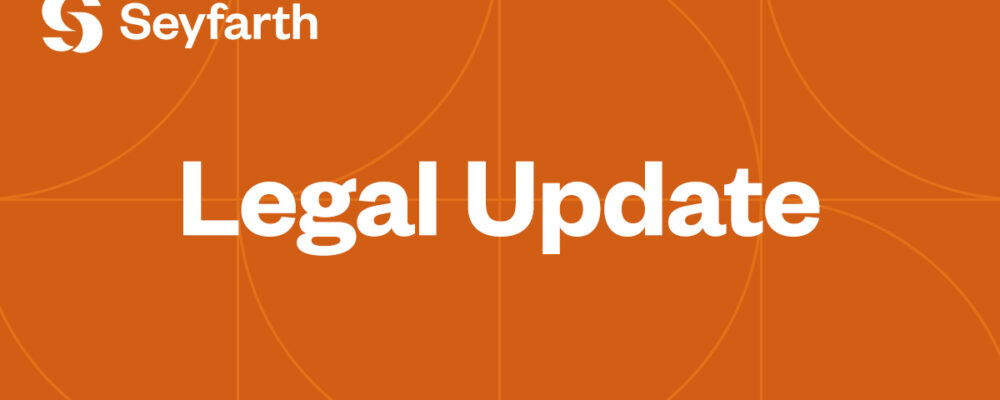As we previously reported, on July 31, 2024, Massachusetts enacted salary range transparency legislation (“An Act Relative to Salary Range Transparency”) that imposes salary disclosure requirements on Massachusetts employers. The Act took effect on October 29, 2025. Employers with more than 25 employees in Massachusetts must now disclose salary range information on job postings and provide pay range information to current employees in certain circumstances. Additionally, employers with more than 100 employees in Massachusetts must submit EEO and pay data to the Commonwealth annually for the purposes of aggregated public reporting by the Massachusetts Department of Labor.
Salary Range Disclosure Requirements
All public and private employers that had more than 25 employees in Massachusetts in the prior calendar year must now comply with the following requirements:
- Job postings: Include the annual salary range or hourly wage range that the employer “reasonably and in good faith expects to pay for such position at that time” of posting. This requirement applies to postings made directly by an employer or through third party recruiters.
- Current employees: Upon request, provide the pay range for the position currently held by the employee – even if there is no vacancy in the role.
- Promotions and Transfers: Disclose the pay range to any current employee offered a promotion or transfer to a new position.
The Massachusetts Attorney General’s Office has issued FAQs (https://www.mass.gov/info-details/pay-transparency-in-massachusetts) clarifying these obligations.
Notable clarifications include:
- Commission and Piece Rate Roles: Employers must disclose the expected range of commission or piece rate compensation in job postings.
- Remote Employees: Employees whose primary place of work is Massachusetts must be included in the headcount and are covered by the law.
- Remote Positions: Employers must disclose the pay range for all positions “that can be performed remotely to a Massachusetts worksite” and positions that can be performed by a remote worker who primarily works from Massachusetts. It is not entirely clear what a position that can be performed remotely “to a Massachusetts worksite” means or how broadly that will apply. Employers should consult with counsel when determining which remote positions may be subject to the Act.
- No Qualification Threshold: Applicants are entitled to pay range disclosures regardless of their qualifications for the position.
Reporting Requirements
As a reminder, the Pay Transparency law also requires employers with more than 100 employees in Massachusetts to submit annually their most recently filed federal EEO-1 (and other applicable EEO reports) reflecting Massachusetts employees. The next report is due to the Secretary of the Commonwealth no later than February 1, 2026. Employers can submit reports through the Commonwealth’s EEO Data Reporting portal (https://www.sec.state.ma.us/divisions/corporations/eeo-data-reports.htm).
Enforcement and Penalties
The Pay Transparency law is enforced exclusively by the Massachusetts Attorney General’s Office. There is no private right of action for applicants or employees. The Attorney General can seek declaratory or injunctive relief or impose fines in accordance with the following schedule:
- First offenses are subject to a warning.
- Second offenses are subject to a fine of not more than $500.
- Third offenses are subject to a fine of not more than $1,000.
- Fourth or subsequent offenses are subject to civil fines of $7,500 to $25,000 per violation, depending on the circumstances.
Employers are also prohibited from retaliating against applicants or employees who exercise their rights under the Act, including, for example, requesting the pay range for a position, complaining to the employer or the Attorney General, or instituting or participating in a proceeding under the law.
Nest Steps
Now that the job posting requirements have taken effect, we recommend employers do the following:
- Establish pay ranges for each role. Develop a methodology for how pay ranges are or will be determined for positions. This will ensure ranges are set “reasonably and in good faith.”
- Audit current job postings and templates. Ensure all job postings for Massachusetts-based positions include a clearly defined and accurate pay range. Be sure to provide updated job postings and information to any third-party recruiters engaged to post job openings on your behalf.
- Update internal policies. Ensure internal policies are updated to reflect the requirements pertaining to pay transparency in Massachusetts and that all Human Resources and recruiting staff understand these new obligations.
Note that the Act’s requirements may apply to remote positions reporting into Massachusetts or tied to a Massachusetts office or location. If you are unsure what positions may be covered by the Act’s requirements, please consult with your Seyfarth wage and hour attorneys.
“With approximately 900 lawyers across 17 offices, Seyfarth Shaw LLP provides advisory, litigation, and transactional legal services to clients worldwide.”
Please visit the firm link to site





